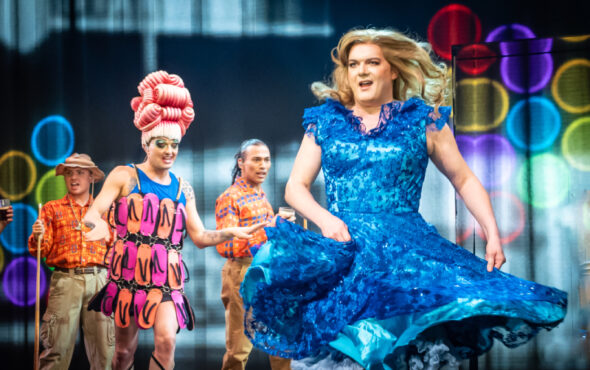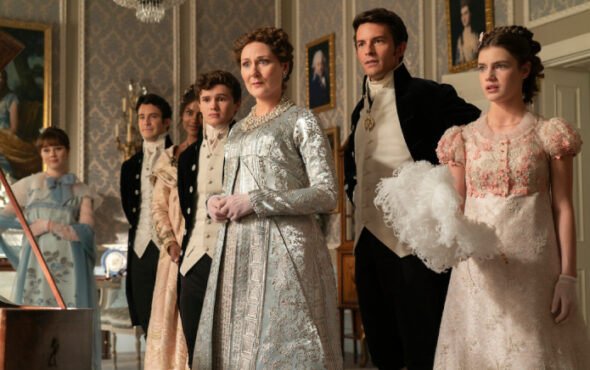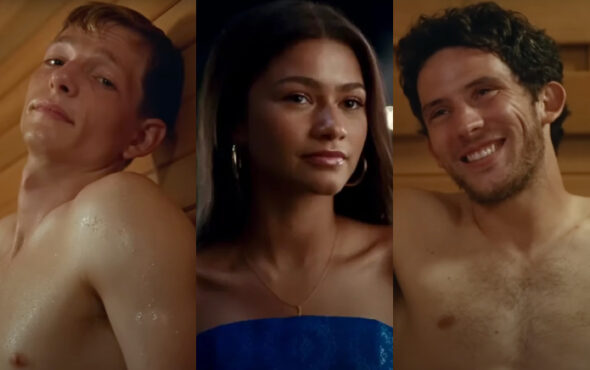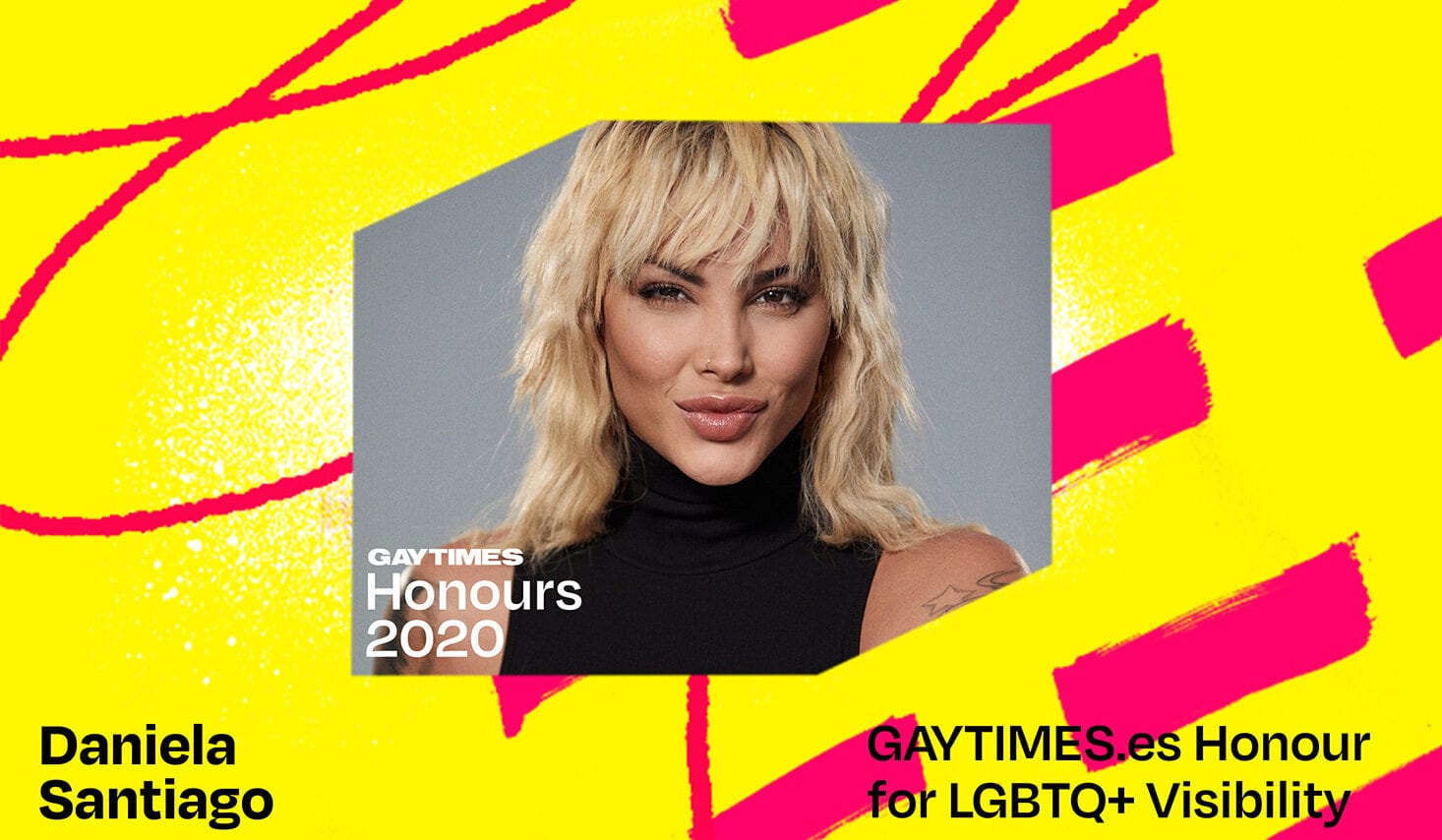
Daniela Santiago has been named the recipient of the GAY TIMES en Español Honor para la Visibilidad LGTBIQ+ (GAYTIMES.es Honour for LGBTQ+ Visibility). Daniela is a Spanish actress who recently starred in the TV show Veneno. She plays the leading role with two more actresses in different stages of the character’s life, Jedet and Isabel Torres.
The series is inspired by the memories of Cristina Ortiz, popularly known as La Veneno (the poison, in English), a transgender woman that was famous in Spain in the 90’s taking part in late night TV shows and becoming an icon for LGTBQ+ people. The show has become a bona fide hit.
It had the best debut of a series on AtresPlayer, the platform that it is available to stream on, and is available in the USA through HBO Max, which recently announced its expansion to Latin America. The program has already made history, with trans people taking part in all production departments of the series, from the script to the makeup, not to mention the humanistic approach to the characters, and an avant-garde narrative that does not stigmatise or ridicule trans people as we were used to seeing.
The critically and commercially acclaimed series, created by the Spanish directors Javier Calvo and Javier Ambrosi (aka Los Javis), is inspired in the book Not A Whore, Not A Saint: The Memories of La Veneno written by Valeria Vegas.
Hello Daniela, we would like to congratulate you on your excellent work on the series.
Thank you very much darling, it has been a very beautiful job. A little complicated due to the circumstances in which it was filmed, but it has been done from the emotion, from the heart, from the truth of a group that needed to shout and I’m very happy having participated and been working on this project.
What do you think of the representation that has been made of trans people in film and on television so far?
I think that in Spain there has been very few opportunities for transgender people to prove their worth. I think they didn’t understand the meaning of what it was to be a trans woman or a trans man and they thought they could characterize a cisgender person and call this a trans one. This is what they were used to doing, mostly because they didn’t have many references of transgender actresses. I hope and wish with all my heart that from now on, it has been shown that there is trans talent able to interpret any type of role. They can take off from there and give us more job opportunities.
Veneno sees you make your television debut. How did you get the role?
I got the role because a friend from Barcelona phoned me to tell me that there was an open casting for a series about the life of Cristina Ortiz. She told me that I could fit it very well because I always wanted to be an actress but due to life circumstances I have had other jobs and I have not been able to dedicate myself to what I always liked, which is acting. I decided to go to the casting that was held in Malaga. I did the test, the girl who coordinated the casting loved me, they did a second interview with me in my apartment, the next call they summoned me directly to Madrid. Los Javis (creators of the show) saw me and were immediately smitten and they gave me the role.
Did you get to meet Cristina in person?
Yes, I met Cristina in Madrid, in Chueca. I was having a beer in a bar and I saw her from a distance. I was very curious to meet her as she was someone that I admired artistically because I wanted to be like her one day. At that time I shared a flat with four friends, a very small flat and I wanted to get out of there and try my luck. At that time she offered me to live with her and I stayed for a month, but I was very young and she already had a life so I preferred to move back to my friends.
What do you think she would think of the series?
I think Cristina would be very proud, and I think she would be very happy to see the turnaround that her life has given. That is, now Cristina has really “crossed the Mississippi” and is now known all over the world. And I think she would be happy to see that the actresses who have embodied her life have done so from love and admiration for her and for all the companions who left their lives at that time to defend the trans community.
Do you think that Veneno will bring any change to the lives of trans people and the LGBTQ + community in general?
I sure do hope so! I hope they start to give real opportunities and that people look in the mirror and realize that we have never hurt anyone, we just want to be ourselves. We have lived our life the best that we can for the best that they have let us live it. And I hope that people really defend us and help us normalize our way of being, because it is as natural as that of anyone.
What is the importance of a series like Veneno?
The message is that you have to look in the mirror and see that we were not doing something right with the trans community. I no longer speak to you in the first person, but rather that people begin to realize the type of injustices that have been committed for a long time due to the lack of information about what a transgender person was. It was always assumed that transgender people had to engage in prostitution or become artists and if that was the case, it was because they left us no other option. It is a message for people to reflect on everything that was done wrong in the Spain of the year ‘96, so that all this is not repeated. And so that the trans collective is respected, so that people put themselves in our shoes. We have always had to be showing more than anyone that we deserve respect, the right to work and the right to love.
Were you expecting all the acclaim the series is getting?
It was a challenge to put myself in Cristina’s shoes. I was very nervous, it was my debut as an actress and for me it was really a huge challenge to do nothing less than the mythical Cristina, La Veneno. Also I interpret the young Cristina, the stage of her life that everyone knows and that people were looking forward to seeing. I was very nervous and very humble. I thought that I was not going to do well enough because people knew her quite well. But with the help of Los Javis and the wonderful Atresmedia team, I started to catch it little by little and I think I did it relatively well. After the premiere and seeing the positive reception that people had and how far this series is going confirms that we did a good job and that people have seen it, I am very happy about that.
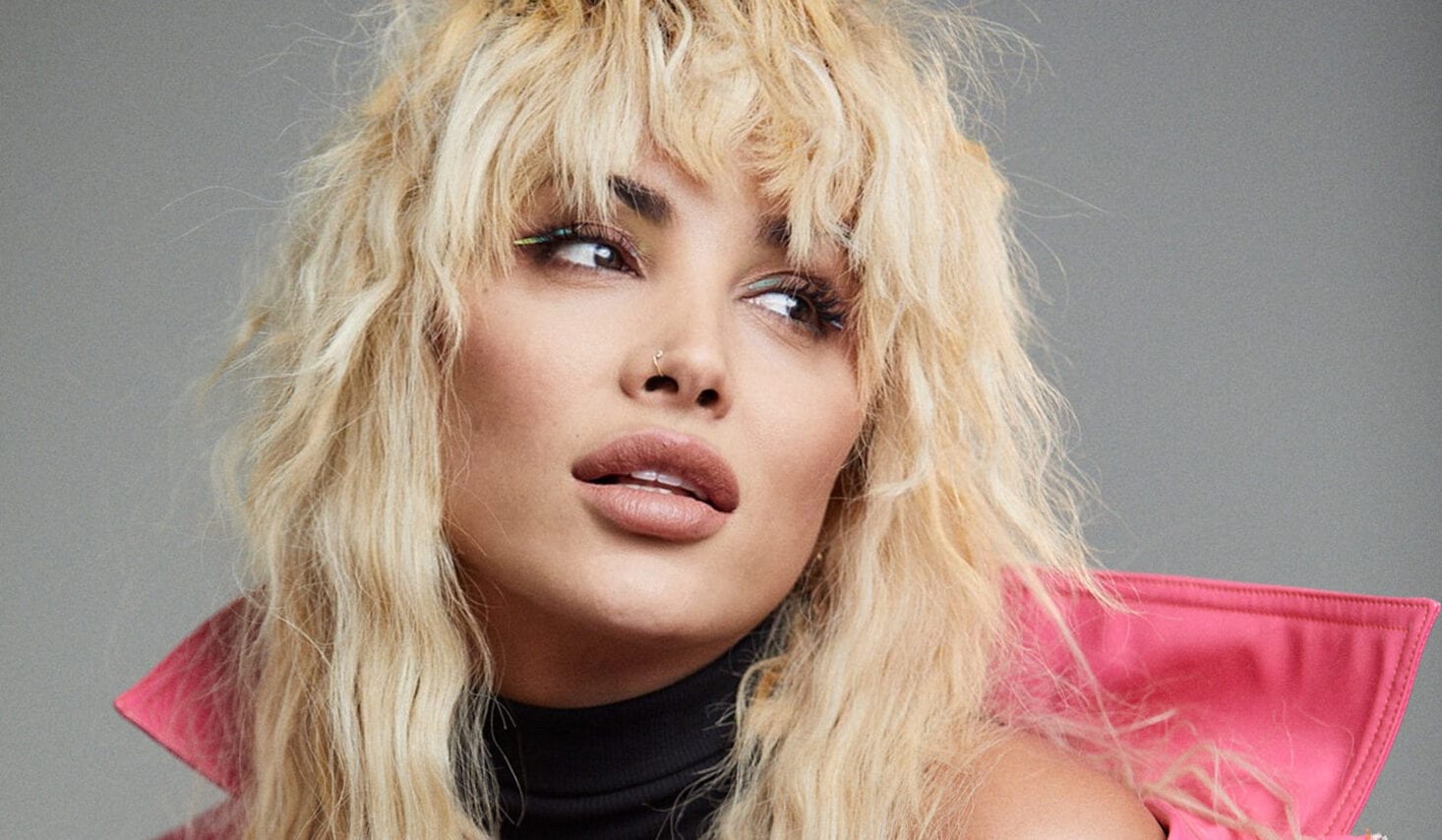
GAY TIMES en Español
Daniela Santiago es una actriz española que ha realizado su debut en televisión en la serie “Veneno”. Al lado de otras dos actrices, Jedet e Isabel Torres, actúa como protagonista en diferentes etapas de la vida de la personaje principal. La serie narra la historia de Cristina Ortiz, La Veneno, una mujer transexual que se hizo famosa en España en los años 90 participando en programas de televisión y convirtiéndose en un icono para personas LGTBIQ+.
La serie es todo un éxito. Tuvo el mejor estreno de una serie en la plataforma AtresPlayer Premium, y está disponible en EE.UU. a través de HBO Max, que recientemente anunció su expansión a Latinoamérica. “Veneno” marca un hito al contar con personas trans en todos los departamentos de producción de la serie, desde el guión hasta el maquillaje, sin mencionar el carácter vanguardista de la narrativa que no estigmatiza ni ridiculiza a las personas trans como estábamos acostumbrados a ver.
Aclamada por la crítica, la serie creada por los directores Javier Calvo y Javier Ambrosi está inspirada en el libro “¡Digo! Ni puta, ni santa: Las memorias de La Veneno” escrito por Valeria Vegas.
Hola Daniela, ¿cómo estás? muchísimas gracias por concedernos esta entrevista y antes de nada me gustaría felicitarte por tu excelente trabajo en la serie.
Muchísimas gracias cariño, ha sido un trabajo muy bonito, un poquito complicado por las circunstancias en las que se grabó, pero que se ha hecho desde la emoción, desde el corazón, desde la verdad de un colectivo que necesitaba gritar, y estoy muy feliz de haber participado, de haber estado trabajando en este proyecto.
¿Qué opinas de la representación que se ha hecho de las personas trans en el cine y en la televisión hasta ahora?
Creo que en España se había dado muy pocas oportunidades a personas transexuales para que pudieran demostrar su valía. Creo que no entendían el significado de lo que era ser una mujer o un hombre trans y pensaban que podían caracterizar a una persona cisgenero y a esto llamarlo trans. Esto es lo que estaban acostumbrados a hacer, porque no tenían muchas referencias de actrices transexuales. Espero y deseo de todo corazón que a partir de ahora que se ha demostrado que sí hay talento trans para interpretar cualquier tipo de papeles, puedan tirar de ahí y darnos más oportunidades laborales.
Veneno es tu estreno en la televisión. ¿Cómo te hiciste con el papel?
Me hice con el papel de Veneno porque una amiga de Barcelona me llamó por teléfono para comentarme que había un casting en abierto para una serie sobre la vida de Cristina Ortiz. Me dijo que yo podría encajar muy bien porque siempre quise ser actriz, pero por circunstancias de la vida he tenido otros trabajos y no he podido dedicarme a lo que siempre me gustó que es la interpretación. Decidí ir al casting que se hacía en Málaga, hice la prueba, a la chica que coordinaba el casting le encanté, me hicieron una segunda entrevista en mi apartamento, la siguiente llamada me citaron directamente en Madrid, me vieron los Javi, y los enamoré, así que me dieron el papel.
Llegaste a conocer a Cristina en persona…
Sí, yo a Cristina la conocí en Madrid, en Chueca, estaba tomando una cerveza en un bar y la vi de lejos. Tenía muchísima curiosidad por conocerla, era alguien que yo admiraba artísticamente porque quería llegar a ser como ella algún día. En aquel entonces yo compartía piso con cuatro amigas, un piso muy pequeño y quería salir de allí para probar mi suerte y ella en aquel momento se ofreció a que viviese con ella. Estuve un mes, pero yo aún era muy joven y ella ya tenía una vida hecha, así que preferí volver con mis amigas. Duré muy poco con Cristina.
¿Qué crees que ella opinaría de la serie?
Pienso que Cristina se sentiría muy orgullosa y que se sentiría muy feliz de ver el vuelco que ha dado su vida, o sea que realmente ahora sí que ha cruzado el Mississippi y se le conoce en todo el mundo. Y pienso que estaría feliz de ver que las actrices que han encarnado su vida lo hayan hecho desde el amor y desde la admiración hacia ella y hacia todas las compañeras que se dejaron la vida en aquel tiempo para defender el colectivo trans y creo que se quedaría feliz.
¿Crees que “Veneno” aportará algún cambio en la vida de las personas trans y de la comunidad LGTBIQ+ en general?
¡Eso espero! Y que empiecen a dar oportunidades de verdad y que la gente se mire en el espejo y se de cuenta de que nunca hemos hecho daño a nadie, solamente queremos ser nosotras. Hemos vivido nuestra vida lo mejor que se puede o lo mejor que nos han dejado vivirla. Y espero que la gente realmente nos defienda y nos ayude a normalizar nuestro colectivo y nuestra forma de ser porque es tan natural como la de cualquier persona.
¿Cuál es la importancia de una serie como “Veneno” en los días actuales?
El mensaje es que hay que mirarse en el espejo y ver que algo no estábamos haciendo bien con el colectivo trans. Ya no te hablo en primera persona, sino que la gente empieze a darse cuenta del tipo de injusticias que se ha cometido durante muchísimo tiempo por la falta de información sobre lo que era una persona transexual. Siempre se daba por hecho que las personas transexuales tenian que dedicarse a la prostitución o ser artistas y si eso era así es porque no nos dejaban otra opción. Es un mensaje para que la gente reflexione sobre todo lo que se hizo mal en aquella España del año 96, para que todo esto no se repita. Y para que se respete al colectivo trans, para que la gente se ponga en nuestra piel. Hemos tenido que estar siempre mostrando más que nadie que merecemos respeto, el derecho a poder trabajar y el derecho a amar.
¿Esperabas toda la aclamación que está recibiendo la serie?
Fue un reto ponerme en los zapatos de Cristina. Yo estaba muy nerviosa, era mi debut como actriz y para mi fue realmente un reto enorme hacer ni más ni menos que de la mítica Cristina, la Veneno. Encima que yo interpreto la etapa joven, la etapa que todo el mundo conoce y que la gente estaba deseando ver. Estaba muy nerviosa y con mucha humildad, pensaba que no lo iba a hacer bien porque la gente la conocía mucho. Pero con la ayuda de los Javis y del equipo maravilloso de Atresmedia lo fui cogiendo poco a poco y creo que lo hice relativamente bien. Después del estreno y de ver la acogida tan positiva que tuvo y lo lejos que está llegando esta serie me confirma que hicimos un buen trabajo y que la gente lo ha visto, estoy muy feliz por eso.
